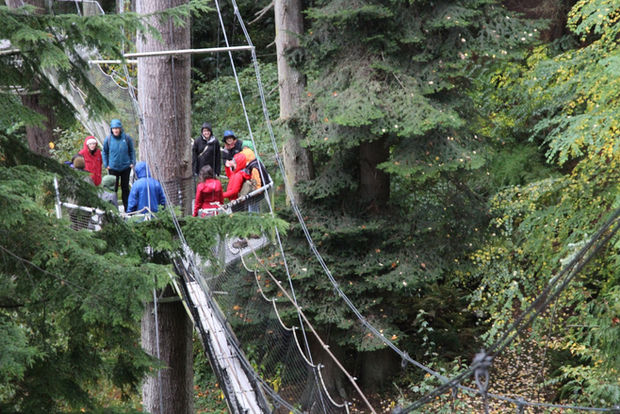
Sustainability is a common thread in most of my projects and work. Here I describe selected experiences related to working towards sustainable well-being in my community. These experiences demonstrate project management, team coordination, engagement, and communication skills.
Sustainability in Action
City of Vancouver (Community Planning - Making Room, 2018-Present)
In the last few months, I have heard that a good housing policy could help combat climate change. And similarly that a good land use plan is crucial to a good climate strategy. My current project for the City of Vancouver uses community planning as a tool to ensure that people can live close to their daily needs. This would allow people to walk or roll instead of driving private automobiles, thus significantly reducing GHG emissions. Creating complete communities could also facilitate social connections, which improves resiliency.
City of Vancouver (Sustainability Group, 2017-2018)
As a Planning Assistant, I helped bring sustainability to the public realm through communication & engagement, and research. I performed both qualitative and quantitative research on topics such as other municipal climate action plans, electric vehicles (interviews), corporate/internal carbon pricing, urban green infrastructure, mug sharing, and bicycle parking requirements in multi-unit residential buildings. This research was different from academic research in that it was brought into the public realm through policies and practice. I was also able to work on public engagement initiatives and communicate to the public through the Greenest City social media channels. Some highlights of projects I was able to help with include the Coastal Adaptation Plan, a Blue Carbon workshop (co-hosted with CoV's sister city, Yokohama!) and Vancouver Building By-law updates.
Rewild Vancouver (UBC, 2016-2017)
This project unites my passions for biology + community. While Vancouver has many beautiful parks, it is still like most urban areas in that it demonstrates habitat fragmentation. My group wanted to address this by connecting green space to green space through a gap we identified: residential land. Once we identified the needs of our community, we created a communications plan. We made kits of native species and simple, user-friendly instructions for people with any skill level or dwelling type. We planned and implemented a strategy that engaged residents in biocultural initiatives and allowed them to take Greenest City goals into their own hands and homes. This project addresses topics such as biodiversity loss, access to nature, and native species in an accessible way. We have distributed over 100 kits and plenty of native plant knowledge at the Riley Park Community Garden (where we hold a demonstration plot), the Cambie Village Evergreen GreenBloc event, and City of Vancouver Tree Sales.
Read about it on CityStudio’s website here.
More info here.
Various Education for Sustainability Activations:
-
“This is a classroom. What can we learn here?” wood art installation on a fence along the seawall, which blocked off a brownfield site.
This brought attention to the fact that any space can effectively be a place of learning. On wooden blocks, we wrote words about the past, present, and potential future of that space. History nodded to the Coast Salish people and the destruction and displacement done in favour of industry. We shed light on the present state of development and also visioned future uses, like gardens, education centres, etc. We provided cards and invited the public to add what they would like to learn there. It was participatory and very effective.
-
Rewilders’ day of teaching.
Morning meditations facing the sea, a rainy educational canopy walk at the UBC Botanical Garden, lunch at the UBC Farm, and planting trees with Metro Vancouver. We used outdoor space as a classroom to teach species identification, the mental benefits of nature, and just to remind people to get outside. The themes of the day were "connect" and "create".
-
Evergreen GreenBloc:
I coordinated with representatives from GreenBloc so that we could launch/prototype some of our kits at their Cambie neighbourhood BBQ. Regardless of the rain, we were able to engage residents and mobilize kits and knowledge.
-
CoV Tree Sale:
The Rewilders have attended 2 CoV Tree Sale events and sold out of kits both times! I supported this project by creating educational graphics with information about our team, the kits, and a plant ID guide.
-
Riley Park Community Garden:
We had a native species teaching garden bed there, and I attended Saturday work parties to tend to the plants and build community. Our final activation involved all of our cohort and various stakeholders, including people from GreenBloc, Riley Park, and the Park Board. Although it was raining (again), everyone got their hands dirty, helped move the plants and co-create Green Streets beds on Ontario St.
-
Hygge for the holidays:
We closed off a rainy semester with an indoor CityStudio activation. A re-cap of the Rewilders’ group project, complete with hot chocolate and a wreath-making activity using natural pieces from Vancouver. This still brought attention to native plants, but was mostly about connection and reflection.
-
EfS Conference Presentation:
I presented my research piece on Key Sustainability Competencies and Transformative Learning to the cohort on the top of Pender Hill (Sunshine Coast) after we hiked up. To demonstrate transformative learning, we did a natural history journal activity and focused on one piece of nature. I invited the cohort to think about relationships: how could this single thing in nature relate? In terms of past, present, or future? In terms of ecosystems or urban systems? In terms of settler relationships? And what about human, non-human, or more-than-human relationships?













